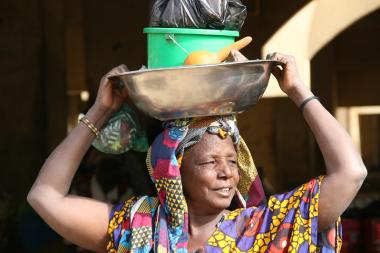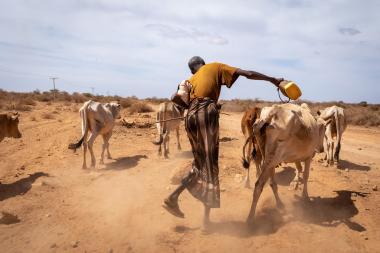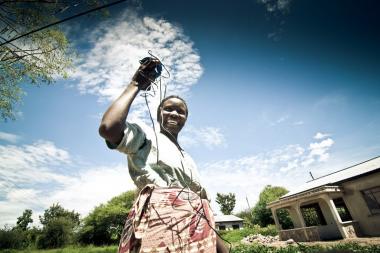Blog
COP27: Climate finance continues to miss many of the world’s most vulnerable
As political leaders, donors, researchers and practitioners gather for COP27, the conference must be a platform to urge for more investment to support some of the world's most vulnerable.
Publisher SPARC
As world leaders gather in Sharm el-Sheikh, Egypt for COP27, I feel I haven’t yet digested the outcomes from COP26. Predictably, the lead up to this COP has involved a range of debate between the political left and right, climate activists versus skeptics, and discussion on how to finance badly needed climate action in the context of high inflation and global recession.
Barely audible through this noise is the humanitarian disaster unfolding in East Africa. SPARC has highlighted previously how the failing rains in East Africa, which are leading to famine conditions not seen in decades, could have been mitigated by “anticipatory action”, and how food price shocks are having drastic consequences for vulnerable people. We have detailed the disproportionate impact of this on girls in conflict-affected pastoral communities in Nigeria. How can we ensure that the machinery around COP is not a distraction from providing effort to address drastic, immediate needs to the most vulnerable?
A different climate finance architecture is needed
SPARC’s work on climate change focuses on two inter-related areas. First, we are addressing the major failure in the current climate finance architecture to get resources to where they are most needed. That the existing finance is so shamefully mis-directed to “safe” and low-risk regions ignores the fact that countries in conflict are most in need of resources to adapt to climate change. Witness countries such as Burkina Faso, Mali and Somalia: all face a myriad of problems – from basic governance to active conflicts – meaning a very low likelihood of being able to spend and account for climate funding.
SPARC is directly addressing this gap in West Africa, together with the West African Development Bank and a SPARC partner, ILRI, with focus on required action, including working with credible intermediaries, adjusting risk tolerance, simplifying climate finance vetting processes, and rapidly building the capacity of project developers.
Investment in learning and research as key
Secondly, we see continued investment in learning and research as a key catalyst to sustained and successful action in fragile and conflict-affected settings. Unlocking good ideas and avoiding failures means open and critical debates on what works and what does not. We must accept and learn from mistakes. Only by critically assessing what works and what does not can we construct a clear pathway forward.
SPARC partner Mercy Corps is at the forefront of assessing how innovation in pastoral areas can help build resilience in fragile contexts, highlighting, for example, how social media is used by pastoralist communities and the important role of local influencers in changing behaviours.
SPARC’s COP27 agenda
SPARC’s goals at this COP are straightforward. First, to make sure that pastoralists and those making their livelihoods in fragile states are not forgotten. Increasing climate finance is essential, but it has little meaning unless it is directly able to reduce human suffering and address critical needs. Second, to ensure that donor agencies recognise that most of their funding goes to relatively “safe” jurisdictions. SPARC partner, ODI, is working closely with key humanitarian organisations to bring together believers in a different climate finance architecture, one that can reach “last mile” communities. In fact, the complete dysfunction in how climate finance is allocated must be a top priority to fix. New and effective ways to ensure funding gets to organisations and communities in, for example, conflict-affected states is essential.
SPARC now includes a range of partners who share this vision: Cowater International, Mercy Corps, ODI, ILRI, the Jameel Observatory, the West African Development Bank, and of course our funding partners, the UK Foreign, Commonwealth and Development Office and the International Development Research Centre.
COP is a burden, though arguably a necessary one, for it helps galvanize and motivate, allows for a grand networking of ideas and approaches, and pressures States to act. Could it take place every two years? Probably. Could it be smaller and reduce the enormous carbon footprint involved? Surely yes. There are probably better – more carbon friendly ways – of doing this. COP26 produced 102,500 tonnes of CO2e, calculated at the request of the UK Government. But COP27 is bringing together the key actors that matter, especially when it comes to climate finance. Until a reform is made of how COP works and if it can be more effective, it will continue to be the main draw.
We will look carefully at what comes out of COP27 and make sure we continue to critically, but above all constructively, engage in ways that help. I invite you to learn more about the COP27 events we will be leading and how you can participate in them here, and join us on Twitter as we live tweet from our COP27 events.

Dollars
Credit Image by Antonin / The Toch - CC BY-SA 2.0


